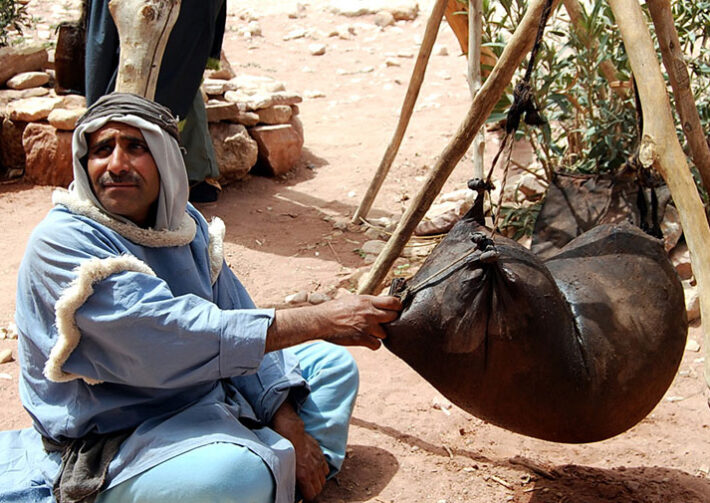Christian Art | New Wine In Old Bottles | King James Audio Bile KJV
Luke 5: 33-39 – Week 22 Ordinary Time, Friday (King James Audio Bible KJV, Spoken Word)
33 ¶ And they said unto him, Why do the disciples of John fast often, and make prayers, and likewise the disciples of the Pharisees; but thine eat and drink?
34 And he said unto them, Can ye make the children of the bridechamber fast, while the bridegroom is with them?
35 But the days will come, when the bridegroom shall be taken away from them, and then shall they fast in those days.
36 ¶ And he spake also a parable unto them; No man putteth a piece of a new garment upon an old; if otherwise, then both the new maketh a rent, and the piece that was taken out of the new agreeth not with the old.
37 And no man putteth new wine into old bottles; else the new wine will burst the bottles, and be spilled, and the bottles shall perish.
38 But new wine must be put into new bottles; and both are preserved.
39 No man also having drunk old wine straightway desireth new: for he saith, The old is better.
Jesus fasted in the wilderness for 40 days toward the start of his ministry. This was a time of preparation, while Jesus was tempted by Satan. Matthew’s Gospel account most fully expresses the time of fasting as one in which Jesus declares his assumed humanity to be in accord with his Father’s will, oriented toward God’s saving purpose. Fasting is an aspect of many historical religions. We are asked to fast at particular times, and as we do, in our physical hunger, we may discover a closer relationship with God, even when our fasting can be mentally challenging.
Now, though, as Jesus teaches his disciples, living with the disciples and inculcating them within a whole praxis geared toward their evangelical mission to come, Jesus does not require that the disciples fast. The disciples are free to eat and drink just as they please. We may quite understand that the disciples’ time with Jesus is a time of great celebration. Each day must have seemed like a feast day!
Christ’s declaration of himself as the bridegroom clearly identifies him as God the Son, just as God the Father in the Old Testament identified Himself as the bridegroom of the people of Israel. Jesus’ time incarnate on Earth is the wedding feast, through which all humanity is enabled to be reconciled with God. Jesus declares his true identity, as at the heart of Scripture.
There is respect for the old ways, however. Jesus has come to inaugurate a new age, but the Jewish people remain dearly loved by God, even when they cannot recognize Jesus as God the Son. God does not renege on His Covenant so easily. Jesus understands. When a man is accustomed to old wine, he will not straight away desire the new. Where there is conflict, and how there has been terrible conflict, we must respect a man’s right to look to his customary ways and say the old is better.
Concluding Prayer | Love Revealed By Jesus Christ
Lord God,
the Cross reveals the mystery of your love:
a stumbling block indeed for unbelief,
but the sign of your power and wisdom to us who believe.
Teach us so to contemplate your Son’s glorious Passion
that we may always believe and glory in his Cross.
We make our prayer through our Lord.

![]()
King James Audio Bible | Endnotes
What Does Jesus Mean By New Wine In Old Bottles?
The parable speaks to the human tendency to cling to tradition and resist change, even when it is necessary for growth and progress. The image of new wine bursting old bottles is a vivid one, suggesting that the introduction of new ideas and ways of thinking can be disruptive and even destructive if not handled carefully.
In order to fully understand the significance of this parable, it is necessary to examine its historical and cultural context. Wine was an important part of Jewish culture, both as a symbol of joy and celebration and as a religious offering. In the Old Testament, wine is often associated with abundance and blessing, as in the Psalmist’s description of God’s provision: ‘Thou preparest a table before me in the presence of mine enemies: thou anointest my head with oil; my cup runneth over.’ (Psalm 23:5) Similarly, the prophet Joel speaks of a time of restoration when ‘the floors shall be full of wheat, and the vats shall overflow with wine and oil’ (Joel 2:24).
However, the consumption of wine was also subject to strict regulations and prohibitions in Jewish law. The Book of Leviticus contains detailed instructions for the preparation and offering of wine as a sacrifice, and warns against the dangers of drunkenness: ‘And the LORD spake unto Aaron, saying, Do not drink wine nor strong drink, thou, nor thy sons with thee, when ye go into the tabernacle of the congregation, lest ye die: it shall be a statute for ever throughout your generations.’ (Leviticus 10:8-9)
Against this backdrop, Jesus’ parable of the new wine in old bottles takes on added significance. The Pharisees and scribes, who were experts in Jewish law and tradition, criticized Jesus for associating with sinners and tax collectors. They saw his message of forgiveness and inclusion as a threat to the established order, and demanded that he conform to their rigid standards.
Jesus responded with the parable of the new wine in old bottles, which challenged their narrow-mindedness and called for a fresh approach to faith and spirituality. He was not rejecting the Old Testament or the traditions of his ancestors, but rather urging his listeners to embrace a deeper and more authentic understanding of God’s will.
Over the centuries, this parable has continued to resonate with Christians. Saint Augustine used the image of the new wine in old bottles to describe the transformative power of God’s grace: ‘The new wine is the grace of the New Testament, which the old bottles of the Jews could not contain.’ (Sermon 93)
Martin Luther saw in the parable a call to break free from the legalistic strictures of the Catholic Church and embrace a more personal and direct relationship with God: ‘We should not pour new wine into old wineskins, lest the wine burst the skins.’ (Luther’s Works, vol. 45)
In our own time, the parable of the new wine in old bottles has taken on new relevance as Christians grapple with the challenges of a rapidly changing world. The message of the parable remains as relevant today as it was in Jesus’ time: we must be open to new ideas and new ways of thinking, even if they challenge our existing beliefs and traditions.
At the same time, we must also be mindful of the importance of preserving the wisdom and insights of the past. As Jesus notes in the parable: ‘No man also having drunk old wine straightway desireth new: for he saith, The old is better.’ There is a deep human instinct to cling to the familiar, to find comfort in the traditions of our ancestors.
But the message of the parable is not simply that we must choose between old and new. Rather, it is a call to balance and discernment, to recognize the value of both tradition and innovation. The old wine may be familiar and comforting, but the new wine has the potential to bring fresh joy and vitality.
In the end, the parable of the new wine in old bottles challenges us to embrace the fullness of God’s grace and to seek a deeper understanding of His will. It reminds us that our faith is not static or fixed, but rather a living and evolving relationship with the divine.








